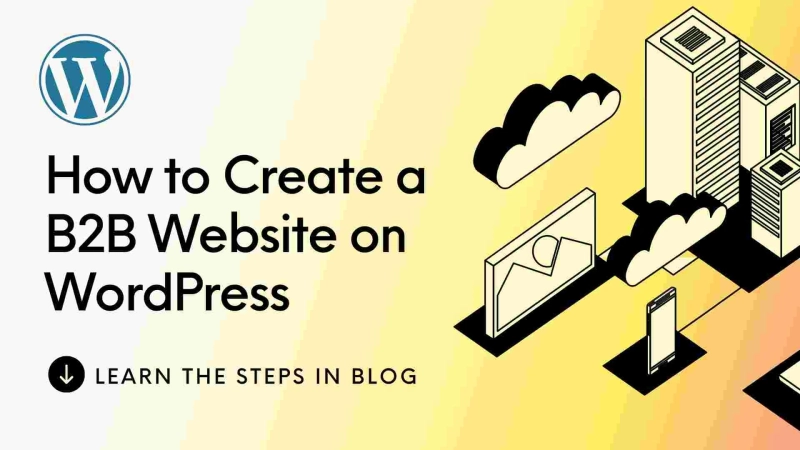Essential Considerations For A B2B Website
Building a B2B website involves strategic planning to cater to the unique needs of business-to-business interactions. Before diving into the WordPress development process, consider the following:
Define Your Target Audience: Understand the specific businesses or professionals you want to target. Tailor your website content and features to meet their needs.
Identify Key Features: Determine the essential features your B2B audience expects. This may include secure logins, product catalogs, bulk ordering options, and streamlined communication channels.
Responsive Design: Ensure your website design is responsive, catering to users accessing your site from various devices.
Why WordPress?
Choose between WordPress.org and WordPress.com
Deciding between WordPress.org and WordPress.com is a crucial first step in your B2B website development journey. Each platform has its unique advantages, and the choice depends on your specific needs and preferences.
WordPress.org
Pros:
Full Control: Opting for WordPress.org gives you complete control over your website. You have the freedom to customize every aspect, from themes to plugins, allowing for a tailored B2B experience.
Custom Themes and Plugins: Access a vast library of custom themes and plugins, enabling you to add specific B2B functionalities and design elements to meet your business requirements.
Scalability: As your B2B business grows, you can scale your website seamlessly. WordPress.org provides the flexibility to expand features and accommodate increasing traffic.
Monetization Options: If your B2B model involves e-commerce or premium memberships, WordPress.org allows you to implement various monetization strategies.
Cons:
Requires Hosting: You need to find a reliable hosting provider and manage your site\'s security, backups, and updates. While this grants control, it also demands additional responsibilities.
Learning Curve: Managing a self-hosted WordPress site might have a steeper learning curve, especially for beginners.
WordPress.com
Pros:
Ease of Use: WordPress.com offers a more straightforward setup process. You can quickly create a B2B website without dealing with the technical intricacies of hosting.
Managed Hosting: Hosting is included, relieving you of the burden of managing server-related tasks. This is particularly beneficial for those not wanting to delve into the technical aspects of website maintenance.
Security and Updates: WordPress.com takes care of security measures and updates, ensuring your B2B site remains protected without your active involvement.
Built-in Monetization: While more limited than WordPress.org, WordPress.com does offer built-in monetization options for premium plans.
Cons:
Limited Customization: Compared to WordPress.org, customization options are more restricted. You might encounter limitations in using custom themes and plugins, affecting the level of personalization for your B2B brand.
Monetization Restrictions: Free plans have limitations on monetization options. To unlock more features, you might need to upgrade to a premium plan.
How to Decide:
Choose WordPress.org If:
- You seek complete control over customization.
- Your B2B model requires advanced features and scalability.
- You are comfortable managing hosting-related tasks or have a dedicated team.
Choose WordPress.com If:
- Simplicity and ease of use are top priorities.
- You prefer a hassle-free setup without dealing with hosting complexities.
- Your B2B requirements align with the features offered in WordPress.com plans.
By carefully weighing these factors, you can make an informed decision that aligns with your B2B website development goals. Remember, both options can lead to a successful B2B website; it\'s a matter of selecting the one that best fits your unique business needs.
How To Create A B2B Website With WordPress?
1. Choose The Right Domain Name & Web Hosting
Selecting a suitable domain name and reliable web hosting is the foundational step in building your B2B website. Here\'s what you need to consider:
Domain Name: Opt for a domain name that reflects your business identity. Ensure it\'s easy to remember, relevant to your industry, and aligns with your brand.
Web Hosting: Look for hosting providers that offer excellent uptime, customer support, and scalability. Consider managed WordPress hosting for a hassle-free experience.
2. Get A Cool B2B Style WordPress Theme
Choosing the right theme sets the tone for your B2B website. Consider these aspects when selecting a theme:
Professional Look: Your theme should exude professionalism, aligning with B2B expectations. Clean layouts and sophisticated designs work well.
Responsiveness: Ensure the theme is mobile-responsive for optimal user experience across devices.
Customization: Pick a theme that allows customization to match your brand colors, logo, and overall aesthetics.
3. Pick A Plugin
WordPress plugins add functionality to your site. For a B2B website, consider plugins that enhance user experience and provide essential features:
WooCommerce: If your B2B model involves e-commerce, WooCommerce is a powerful plugin for managing products, transactions, and invoices.
LiveChat: Implement a live chat plugin to facilitate real-time communication, addressing queries, and building client relationships.
Yoast SEO: Optimize your B2B site for search engines with Yoast SEO to improve visibility and organic reach.
4. Write Headlines That Stand Out
Compelling headlines are crucial for grabbing attention and conveying your B2B offerings. Follow these tips:
Clarity: Clearly communicate the value proposition in your headlines. B2B clients appreciate directness and clarity.
Keyword Integration: Incorporate relevant keywords naturally to enhance search engine visibility.
Conciseness: Keep headlines concise while conveying essential information. Avoid unnecessary jargon.
5. Incorporate Live Chat
Real-time communication is vital for B2B interactions. Integrate live chat functionality to:
Address Queries: Promptly respond to client inquiries, providing instant support.
Build Relationships: Establish a direct line of communication, fostering stronger client relationships.
Capture Leads: Use live chat strategically to capture potential leads and nurture them through the sales funnel.
6. Use CTA (Call to Action) Correctly
Optimizing your B2B website for conversions involves effective use of CTAs. Consider the following:
Clear and Relevant CTAs: Place clear calls to action that guide visitors on the next steps, whether it\'s requesting a quote, contacting sales, or downloading resources.
Strategic Placement: Position CTAs strategically on landing pages, product/service pages, and contact forms for maximum impact.
A/B Testing: Experiment with different CTA designs and placements to identify what resonates best with your B2B audience.
7. Automate The Redirects
Efficiently manage website redirects to enhance user experience and maintain SEO integrity:
Page Restructuring: If you modify your site structure, set up redirects to ensure users are directed to the new pages seamlessly.
404 Error Handling: Implement custom 404 pages with helpful information and navigation options.
Plugin Assistance: Use WordPress plugins like Redirection for easy management of redirects.
By following these steps and incorporating essential elements, you can create a robust and professional B2B website on WordPress that effectively caters to your business objectives and client expectations. Remember, a well-crafted website is a valuable asset in establishing your B2B brand online.
Conclusion
In conclusion, building a B2B website on WordPress demands strategic thinking and attention to specific business-oriented requirements. As you navigate through the steps, including selecting an appropriate domain, integrating B2B-centric plugins, and creating impactful headlines, you\'re shaping a formidable online presence.
Embark on your WordPress B2B website journey with confidence, ensuring that your online platform not only meets but exceeds the professionalism and efficiency expected in the business realm. If you\'re in Bangalore and seeking expert guidance, consider partnering with a reputed WordPress Website Development Company in Bangalore for tailored solutions that elevate your B2B online presence. With the right approach, your WordPress B2B website can be a powerful tool for engaging clients, fostering relationships, and driving business success.



